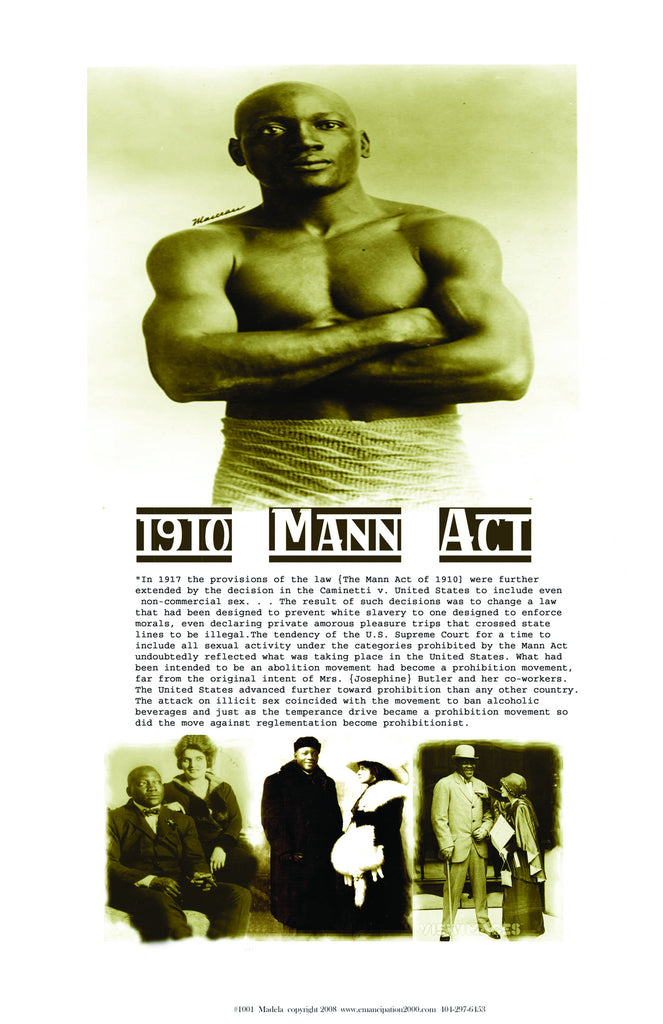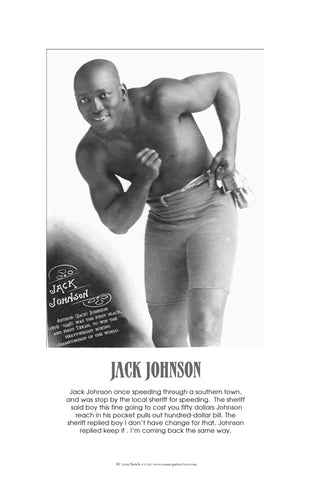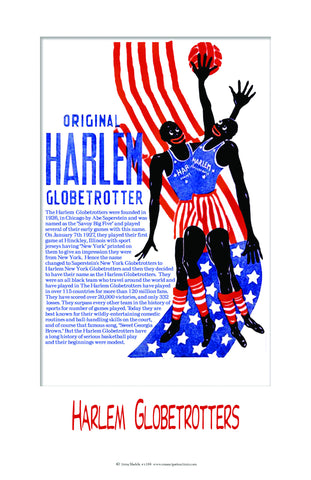Jack Johnson #1369
$ 8.00
Caption from poster__
The Mann Act of 1910
further extended by the decision in the Caminetti v. United States
to include even non-commercial sex. . . The result of such decisions
was to change a law that had been designed to prevent white slavery
to one designed to enforce morals, even declaring private amorous
pleasure trips that crossed state lines to be illegal.The tendency of
the U.S. Supreme Court for a time to include all sexual activity under
the categories prohibited by the Mann Act undoubtedly reflected what
was taking place in the United States. What had been intended to be
an abolition movement had become a prohibition movement,far from
the original intent of Mrs. {Josephine} Butler and her co-workers.
The United States advanced further toward prohibition than any other
country. The attack on illicit sex coincided with the movement to ban
alcoholic beverages and just as the temperance drive became a
prohibition movement so did the move against reglementation become
prohibitionist."
The First African American Heavyweight Boxing Champion of the World Jack Johnson was the first African American, and first Texan, to win the heavyweight boxing championship of the world. Born in Galveston on March 31, 1878, he was the second of six children of Henry and Tiny Johnson. Henry was a former slave and his family was poor. After leaving school in the fifth grade, Johnson worked odd jobs around South Texas. He started boxing as a sparring partner and fought in the "battles royal," matches in which young blacks entertained white spectators who threw money to the winner. Johnson turned professional in 1897 following a period with private clubs in Galveston. His family's home was destroyed by the great hurricane of 1900. A year later he was arrested and jailed because boxing was a criminal profession in Texas. He soon left Galveston for good. Johnson first became the heavyweight champion of Negro boxing. Jim Jeffries, the white champ at the time, refused to fight Johnson because he was black. Then, in 1908, Johnson knocked out Tommy Burns in Australia to become world champion, although he was not officially given the title until 1910 when he finally fought and beat Jeffries in Las Vegas. Jeffries had come out of retirement to become the first of many so-called "great white hopes." Race rioting was sparked after the Johnson-Jeffries fight. The Texas Legislature banned films of his victories over whites for fear of more riots. In 1913, Johnson fled because of trumped up charges of violating the Mann Act's stipulations against transporting white women across state lines for prostitution. During his exile from the U.S., Johnson lost his championship to a white man, Jess Willard, in Cuba in 1915. He returned to the U.S. on July 20, 1920 and was arrested. Sentenced to Leavenworth in Kansas, Johnson was appointed athletic director of the prison. Upon his release, he returned to boxing, but only participated in exhibition fights after 1928. Although married three times to white women, Johnson never had children. He died in a car crash June 10, 1946, near Raleigh, North Carolina. Jeffries, Burns and Johnson 1900s This trio of fighters ruled the heavyweights during the first ten years of the century. James J Jeffries retired as undefeated champion in 1905, after which Tommy Burns, a diminutive Canadian took charge. Burns tenure was doomed the moment he was forced to face Jack Johnson (left), a man destined to become the first black heavyweight champion ever. During a shameful period in American history, a great white hope was sought, with Jeffries brought out of retirement to take on Johnson. He was stopped in 15 rounds and Johnson ruled until 1915. Jack Johnson, heavyweight boxing champion, entrepreneur in 1903 match with Sam McVey Jack Johnson patented a wrench (U.S.patent# 1,413,121) on April the 18th, 1922. Congress Seeks Pardon for Boxing Champion Jack Johnson WASHINGTON (Reuters) - Thu Apr 7, 2005 - U.S. lawmakers are seeking a presidential pardon for Jack Johnson, the first black heavyweight champion, convicted more than 90 years ago in a racially motivated morals case. At the height of his career in 1913, the boxer was convicted and sent to federal prison for one year and one day for violating the Mann Act by transporting a white woman across state lines for immoral purposes. "No one should be punished for choosing to go their own way," said Arizona Republican Sen. John McCain, the leader of the congressional effort for a pardon. "A pardon "would be a strong and necessary symbol to the world of America's continuing resolve to live up to the noble ideals of freedom, opportunity and equal justice for all," McCain said on Wednesday as lawmakers joined professional boxers and other supporters to press their appeal. The Mann Act of 1910 outlawed the transport of women across state lines for the purpose of prostitution or debauchery, or for "any other immoral purpose." "Mr. Johnson's conviction was motivated by nothing more than the color of his skin, as such it injured not only Mr. Johnson, but also our nation as a whole," McCain wrote in a letter to President Bush last month. A pardon would help relieve the nation from the weight of racism and bigotry, the letter said. Five other senators -- Republicans Orrin Hatch of Utah and Ted Stevens of Alaska and Democrats Harry Reid of Nevada and Edward Kennedy and John Kerryof Massachusetts -- signed the letter urging a full posthumous presidential pardon. Johnson died in an automobile accident in 1946.




